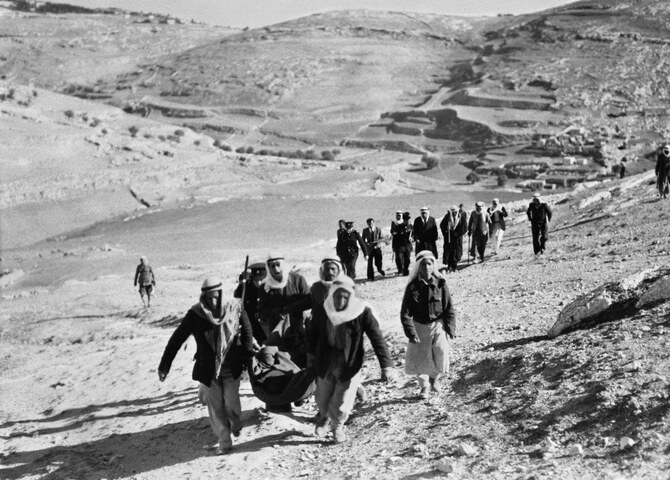It would be wrong to say that the Palestinian village of Deir Yassin, a settlement a few kilometers west of Jerusalem whose origins can be traced back to at least the 16th century, no longer exists.
Certainly, its name has been erased from the maps, and the Arabs and the generations of their forebears who once lived here are long gone, while the remains of the village’s derelict cemetery were bulldozed in the 1980s to make way for a new highway.
But some of the 144 stone buildings of Deir Yassin, including one of the two schools built by the villagers, can still be seen, glimpsed behind a security fence and incorporated into the sprawling campus of an Israeli hospital for the mentally ill.

Old Arab buildings remain from the village of Deir Yassin, now part of a mental hospital in Jerusalem, where irregular Jewish troops massacred over 100 Palestinians and drove out the remaining residents in 1948. (AFP/File)
The Kfar Shaul psychiatric hospital was built on the site of the village in 1951, with no apparent regard, ironic or otherwise, for the traumatic events that had taken place there just three years earlier.
On April 9, 1948, Zionist terrorists attacked Deir Yassin and, in the words of the Palestinian historian Walid Khalidi, carried out “the best known and perhaps bloodiest atrocity” of the civil war that broke out following the adoption by the UN of the controversial Partition Plan for Palestine.
Opinion
This section contains relevant reference points, placed in (Opinion field)
Approximately 250 residents of Deir Yassin, including men, women and children, were massacred in cold blood by members of the Jewish paramilitary Irgun and Lehi organizations.
Just over a month after the massacre, part of the wave of Jewish terrorism designed to seize as much land as possible for the Zionist colonial enterprise, David Ben-Gurion declared the establishment of the State of Israel, on May 14, 1948.
What happened at Deir Yassin in 1948 was by no means unique.

Israeli nuclear whistle blower Mordechai Vanunu (3rd L) joins Palestinians in their memorial march on April 7, 2005 at the original site of their former village of Deir Yassin in Jerusalem. (AFP)
But it was the horror of Deir Yassin, news of which spread quickly, that more than any other single incident symbolized the violent ethnic cleansing of the Palestinians in 1948 that came to be known as the Nakba — “the catastrophe.”
In the 12 months since the Hamas attack on Israel on Oct. 7, 2023, echoes of Deir Yassin and traumatic memories of the Nakba, and of the Naksa “setback,” the subsequent seizure by Israel of the remaining Palestinian territories in 1967, have surfaced afresh in the collective consciousness of the Arab world.

Caption
Over the past year in Gaza, more than 40,000 people, including over 10,000 children, have been killed by Israel’s forces, exacting indiscriminate and disproportionate vengeance for the 1,200 Israelis killed by Hamas on Oct. 7 and the more than 40 hostages are thought to have died in captivity.
On Sept. 17 and 18, Israel began an extraordinary assault on Lebanon, when hundreds of pagers and walkie-talkies boobytrapped by Israeli agents exploded in the hands of members of Hezbollah across Lebanon. More than 40 people were killed and thousands injured, including many civilian bystanders, children among them.
READ MORE: Nakba, 75 years
Days of airstrikes followed, aimed at killing Hezbollah leaders but inevitably claiming more civilian than combatant lives.
By Sept. 25 the Ministry of Health in Lebanon had already reported 558 killed, including 50 children, and more than 1,800 injured.
And then, early on Tuesday, Israeli troops invaded Lebanon.

Smoke rises over Dahiyeh in Beirut's southern suburbs, after Israeli air strikes, amid ongoing hostilities between Hezbollah and Israeli forces, as seen from Sin El Fil, Lebanon, October 6, 2024. REUTERS/Amr Abdallah Dalsh
Once again, Arabs fearing for their lives and those of their children at the hands of Israel are on the move, evoking fraught memories of the Nakba and the Naksa.
On Sept. 24 and 25, “following significant escalation in the armed conflict between Israel and Hezbollah in Lebanon and the subsequent arrival of Palestine refugees from the south seeking shelter in safer areas,” UNRWA (the UN Relief and Works Agency for Palestine Refugees in the Near East) opened three emergency shelters in the vicinity of the city of Saida, on the coast.
UNRWA paints a picture tragically reminiscent of the scenes witnessed in 1948 and again in 1967.

Israeli soldiers operate at a location given as southern Lebanon in this image released on October 6, 2024. (Israel Defense Forces/Handout via REUTERS)
“The intensive airstrikes,” it reports, “have displaced tens of thousands of civilians, with many seeking shelter in the north. The city of Saida has reportedly experienced a large influx of displaced persons, leading to shortages of basic supplies such as bread and drinking water.”
As of Sept. 24, “around 200,000 people were estimated to be displaced in Lebanon,” with almost half on the move since the pager attacks on Sept. 17.
By now the situation is almost certainly even worse. Today, as the world looks on, apparently helpless or unwilling to intervene, history is repeating itself.
































